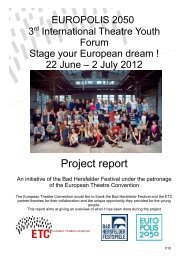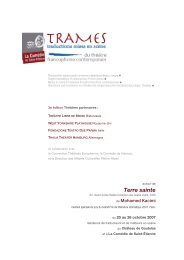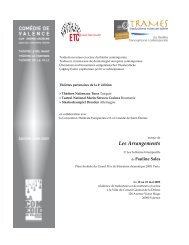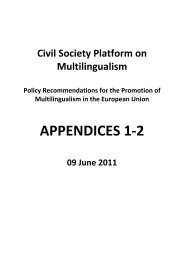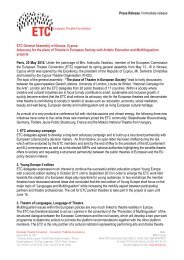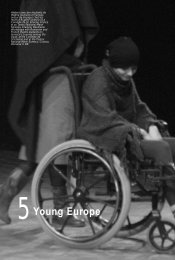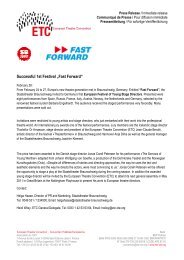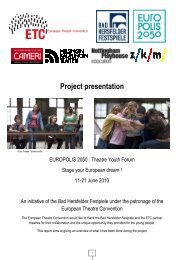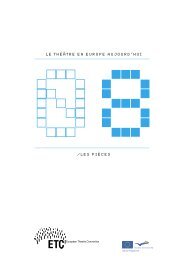Le théâtre en Europe aujourd'hui - European Theatre Convention
Le théâtre en Europe aujourd'hui - European Theatre Convention
Le théâtre en Europe aujourd'hui - European Theatre Convention
Create successful ePaper yourself
Turn your PDF publications into a flip-book with our unique Google optimized e-Paper software.
osnia-hercegovina<br />
> bosna i hercegovina<br />
bosnie-herzégovine<br />
+ info<br />
> www.etc-cte.org<br />
28<br />
ADDRESS/ADRESSE<br />
Grbavicka 7 A<br />
71000 Sarajevo<br />
T: + 387 33 216 873<br />
E: kamerni@lsinter.net<br />
><br />
WORKS/ŒUVRES<br />
Kulin ban (1995); Refugees<br />
(1999); Plaza Hotel (2000); Time<br />
Out (2002); Pomilovanje trazi<br />
radivoje, radivojev sin (2006)<br />
PREMIERE/CRÉATION<br />
Mostarski teatar mladih (Mostar<br />
Young People’s <strong>Theatre</strong>/Théâtre de<br />
jeunes de Mostar)<br />
14.08.04<br />
DIRECTOR/METTEUR EN SCÈNE<br />
Sead Djulic<br />
ADDRESS/ADRESSE<br />
MTM (Mostarski teatar mladih)<br />
88000 Mostar<br />
T: + 387 61 154 153<br />
E: sejodjulic@hotmail.com<br />
PUBLISHER/EDITEUR<br />
Association of Writers in<br />
Bosnia-Hercegovina<br />
Kranjceviceva 24<br />
71000 Sarajevo<br />
T: + 387 33 557940<br />
E: d_pisaca@bih.net.ba<br />
AWARDS/PRIX<br />
First prize, TMACAART magazine<br />
competition/Concours du magazine<br />
TMACAART: premier prix (Mostar,<br />
2004); Best Bosnian Contemporary<br />
Dramatic Text/Meilleur texte théâtral<br />
contemporain de la Bosnie (Festival<br />
of the Bosnian <strong>Theatre</strong>/Festival du<br />
Théâtre Bosniaque, Brcko, 2004)<br />
CHARACTERS/PERSONNAGES<br />
4 male/hommes<br />
3 female/femmes<br />
Zlatko Topcic 1955<br />
glavom kroz zid<br />
headlong through the wall<br />
la tête à travers le mur<br />
Headlong Through the Wall is a comedy about two young people,<br />
Adi, a scriptwriter, and Maja, a film director. Adi and Maja are<br />
in postwar Bosnia-Hercegovina trying to make a film about the<br />
destruction of the Old Bridge in Mostar. Adi’s script wins the first<br />
prize at an anonymous competition organized by the Ministry of<br />
Culture. His joy soon comes to an <strong>en</strong>d wh<strong>en</strong> he realises that the<br />
competition was nothing more than an elaborate hoax to fool the<br />
public and allow a pro-governm<strong>en</strong>t scriptwriter and director to go<br />
ahead and shoot a ‘politically correct’ movie. Our heroes knock on<br />
hundreds of doors trying to find the means to fulfil their dreams<br />
and make the film. They contact war-profiteers, new industrialists,<br />
the Serbian, Croatian, Muslim and Jewish cultural communities<br />
and the International Community, but every single one of them<br />
puts up a series of specific political conditions – ranging from the<br />
casting of family members in the movie to affirm nationalistic<br />
values, to the rewriting of history as a way to “reconciliation and a<br />
better future”. After every unsuccessful meeting, Maja takes down<br />
the date of birth of the person she has be<strong>en</strong> speaking to. Th<strong>en</strong> she<br />
buys a lottery ticket, using all the birth dates she had collected. It<br />
appears she has got the winning combination and the main prize of<br />
1,000,000 Euros. But the play’s ambiguous <strong>en</strong>ding leaves us unsure<br />
as to whether they have really won, or if this is just the hopeless<br />
situation of those who are unwilling to compromise and who come<br />
out losing from the clash with a cruel post-war reality.<br />
Glavom Kroz zid est l’histoire de deux jeunes g<strong>en</strong>s: Adi, un<br />
scénariste, et Maja, une femme metteur <strong>en</strong> scène qui, dans la<br />
Bosnie-Herzégovine d’après-guerre, essai<strong>en</strong>t de tourner un film sur<br />
la destruction du vieux pont de Mostar. <strong>Le</strong> scénario d’Adi gagne<br />
le premier prix d’un concours anonyme organisé par le Ministère<br />
de la Culture, mais sa joie trouvera rapidem<strong>en</strong>t un terme, lorsqu’il<br />
se r<strong>en</strong>d compte que ce concours n’a été qu’un moy<strong>en</strong> de berner le<br />
public, afin de permettre à un scénariste et un metteur <strong>en</strong> scène<br />
pro-gouvernem<strong>en</strong>taux de tourner un film politiquem<strong>en</strong>t correct.<br />
Notre héros frappe à une c<strong>en</strong>taine de portes pour essayer de trouver<br />
les moy<strong>en</strong>s de réaliser leur rêve, mais tous pos<strong>en</strong>t des conditions<br />
politiques spécifiques qui vont de l’<strong>en</strong>gagem<strong>en</strong>t de membres de leur<br />
famille dans le film à l’affirmation de politiques nationalistes <strong>en</strong><br />
passant par des retouches de l’histoire au nom d’une «réconciliation<br />
et d’un av<strong>en</strong>ir meilleur». Après chaque r<strong>en</strong>dez-vous raté, Maja<br />
note la date de naissance de son interlocuteur. Elle finit par jouer<br />
toutes les dates de naissance de leurs interlocuteurs à la loterie.<br />
C’est, semble-t-il, la combinaison gagnante qui leur rapporte le prix<br />
principal de 1.000.000 Euros. Mais à la fin de la pièce, on n’est pas<br />
certain que ce soit la vérité ou une situation sans espoir pour ceux<br />
qui ne sont pas prêts à faire des compromis et qui devi<strong>en</strong>n<strong>en</strong>t ainsi<br />
les perdants dans le conflit avec la cruelle réalité d’après-guerre.



